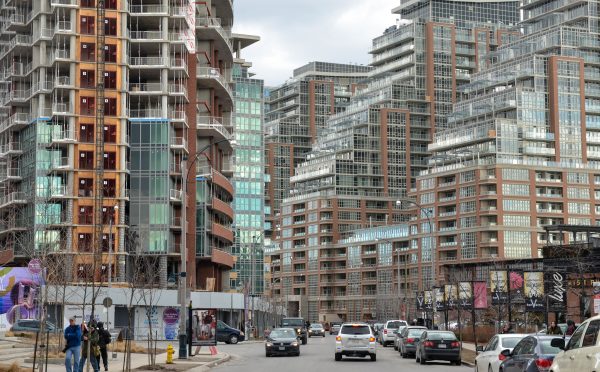
A few weeks ago, a story broke about a family of five who relocated to Toronto from Switzerland for a ten-month work assignment. Unable to find housing, they turned to Airbnb to find a home close to public transit, schools, and work. This story sounds like Airbnb promotional material right up until the point where the family received a bogus eviction notice barely six months into their stay and with less than four weeks’ notice. As a result of the eviction attempt, what could have been an Airbnb ad has opened our eyes to a new problem for Toronto tenants — Airbnb’s long-term shadow rental market.
A deep dive into Airbnb data (checkmark “only short-term rentals” to see how few remain on the platform) illustrates the size of the problem. Today, Airbnb offers more than 12,000 long-term listings in Toronto available on a monthly basis (for a minimum of 28 days, or longer). This inventory represents more than 75% of the company’s total inventory in Toronto. Before the City’s short-term rental rules were enacted in January 2021, which are based on a new bylaw that defines short-term rentals as rentals of 28 days or less and restricts the use of housing stock for short-term rentals to a person’s principal residence, long-term rentals of 28 days or more represented only 15% (or less than 2,000 units) of Airbnb’s total offering. How can we explain this shift? Why has a short-term rental platform become a repository for long-term rentals?
The answer to this question differs from what you would expect. While Toronto has always had some executive rentals available to accommodate professionals on work assignments or out-of-town parents booking into a place while their loved ones were being treated at Sick Kids, what we see today differs from a market response to growing demand. Nor has COVID-19 changed our travel behaviour enough to warrant such a shift. Instead, Airbnb’s long-term rental business is the company’s response to the City of Toronto’s short-term rental bylaw.
Comparing pre-regulation with post-regulation Airbnb data clarifies this point. Once the City’s short-term rental bylaw and associated regulatory framework came into effect in January 2021, only properties that were someone’s principal residence were allowed to be rented short-term on platforms like Airbnb. Investment units routinely used by property managers and so-called “super hosts” were no longer permitted under Toronto’s new bylaw, which defines short-term rentals as rentals of 28 days or less. While observers expected Airbnb to cull its ghost hotel inventory, the company didn’t. To get around the City’s rules, Airbnb adjusted the booking terms for its non-compliant inventory to 28 days or more. This move created a large pool of legal long-term rentals on the platform overnight, growing it from less than 2,000 pre-regulation to over 8,000 after the City’s rules were enacted. This inventory has since grown to over 12,000 available long-term rentals today. We can expect this number to grow even further as time progresses.
Why does this matter, you may ask?
Simply, it matters because the company has positioned itself between landlords and tenants and the tenancies are enacted by signing Airbnb’s service agreement, not by signing an Ontario Standard Lease. While platforms like Kijiji or Craigslist have long advertised apartment rentals, they merely put landlords and tenants in touch, followed by signing a formal lease agreement. Airbnb, however, inserted itself into this relationship by handling everything, from the “booking” to the payment, including issuing hefty service fees. This situation may encourage landlords to use Airbnb to avoid their responsibilities under Ontario’s Residential Tenancies Act (RTA). They may feel they can more flexibly dispose of tenants simply by cancelling their “booking.” It is still unclear whether tenants staying in a place booked through Airbnb will be protected under Ontario’s RTA. It may also be the case that many newcomers entering into long-term tenancies via Airbnb do not know their rights as tenants under Ontario law. Moreover, landlords who feel they can make more money during the summer may simply cancel a booking to take on new “guests” at twice the rate. Once cancelled, Airbnb will quickly follow up by sending notes to the tenants reminding them they must leave by a specific date, irrespective of Ontario’s laws, as was the case experienced by the Swiss family mentioned above.
As accessing rental housing becomes increasingly difficult for tenants in Toronto, leaving access to more than 12,000 housing units to a Silicon Valley-based tech company notorious for exploiting regulatory loopholes is a recipe for disaster. At the same time, these 12,000 units present low-hanging fruit in quickly adding already-built inventory to the market for long-term renters.
It is high time for us to examine how to ensure Airbnb acts within provincial laws and municipal regulations, to tweak these if needed, and for any mayoral candidate running in the June election to promise voters that they won’t fall for any of Airbnb’s regulatory tricks.
Thorben Wieditz is an urban geographer who works at the intersection of labour, community and big tech. He is the Executive Director of Fairbnb Canada Network, which helped establish regulatory frameworks for companies like AirBnB in Toronto, Vancouver, Winnipeg and Ottawa. Follow him on Twitter @twieditz.
photo by Mary Crandall
The post OP-ED: The emergence of the Airbnb rental shadow market is harming tenants appeared first on Spacing Toronto.